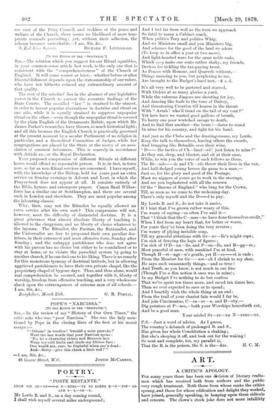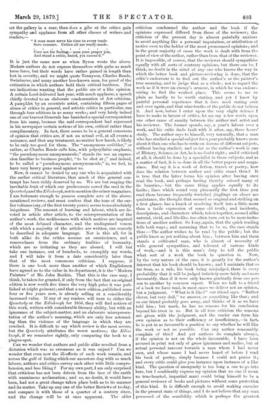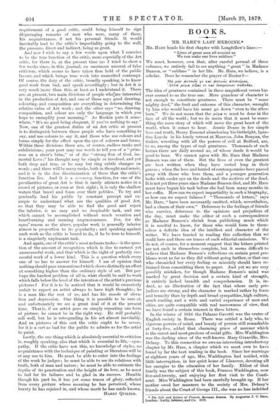ART.
A CRITIC'S APOLOGY.
Fon many years there has been one division of literary crafts- men which has received both from authors and the public very rough treatment. Both those from whose ranks the critics sprang, and those for whose edification and delight they worked,. have joined, generally speaking, in heaping upon them ridicule and censure. The clown's stock joke does not more infallibly
set the gallery in a roar, than does a gibe at the critics gain sympathy and applause from all other classes of writers and readers,— " A man must serve his time to every trade Save censure. Critics all are ready-made.
Care not for feeling,—pass your proper jest, And stand a critic, hated, yet caress'd.'
It is just the same now as when Byron wrote the above.
Modern authors do not express themselves with quite as much terse force, but their words have rather gained in length than lost in severity, and we might quote Tennyson, Charles Reads, Swinburne, and many another less-known man, for proof of the estimation in which authors hold their critical brethren. Nor are indications wanting that the public are of a like opinion.
A certain Lord delivered last year, with much applause, a speech chiefly devoted to an elaborate condemnation of Art criticism. A pamphlet by an eccentric artist, containing fifteen pages of abuse of critics in general, and artistic critics in particular, ran through four editions in as many weeks ; and very lately indeed one of our bravest Generals has banished a special correspondent from his camp, because the said correspondent had expressed in his newspaper certain notions of his own, critical rather than complimentary. In fact, there seems to be a general consensus of opinion that critics are, if not an actual evil, at all events a nuisance, and that any treatment, no matter how harsh, is likely
to be only too good for them. The "anonymous scribbler," or rather, as Charles Reade calls him, with polysyllabic emphasis, -"the pseudonymous anonymuncule," stands (to use an expres- sion familiar to business people), "to be shot at ;" and indeed, to be called a "pseudonymous anonyinuncule," is, we feel, to
have very heavy guns used against us.
Now, it cannot be denied by any one who is acquainted with the earlier critical literature, that much of this general con- tempt has been richly deserved by us. We are but reaping the inevitable fruit of which our predecessors sowed the seed in the Quarterly and the Edinburgh, not to mention the minor magazines. I am fortunate enough to possess complete sets of the above- mentioned reviews, and must confess that the tone of the ear- lier volumes (say, of the first twenty years) seems tome absolutely iniquitous. The amount of learning and labour, which are de- voted in article after article, to the misrepresentation of the author's work, the recklessness with which motives are imputed of the most debased character, and the undisguised venom with which a majority of the articles are written, can scarcely be described in adequate language. Nor is this all, for in both alike do the critics assume an omniscience, and a removedness from the ordinary frailties of humanity, which are as irritating as they are absurd. I will but take one instance, out of hundreds, to exemplify my words, and I will take it from a date considerably later than that of the most venomous criticism. I suppose, if there is one book more than another of which Englishmen have agreed as to the value in its department, it is the "Modern Painters" of Mr. John Ruskin. That this is the case may, I think, be taken for granted, if only from the fact that an original edition is now worth five times the very high price it was pub- lished at (eight guineas); and that a new edition, published some four or five years now, is already selling at a considerably increased value. If any of my readers will turn to either the Quarterly or the Edinburgh for 1856, they will find notices of this work, written with considerable literary ability, but with an ignorance of the subject-matter, and an elaborate misrepresen- tation of the author's meaning, which are only less astound- ing than the violence of the language in which they are
couched. It is difficult to say which review is the most severe, but the Quarterly attributes the worst motives; the Edin- burgh, if we remember rightly, only comparing the book to a
plague-spot.
Can we wonder that authors and public alike revolted from a dictation which was as erroneous as it was unjust ? Can we wonder that even now the ill-effects of such work remain, and across the gulf of feeling which our ancestors dug with so much labour, authors and critics survey each other with little compre- hension, and less liking ? For my own part, I am only surprised that criticism has not been driven from the face of the earth with unanimous acclamation ; and so, no doubt, it would have been, had not a great change taken place both as to its manner and its matter. Take up any one of the better Reviews of to-day, and compare it with those of a quarter of a century since, and the change will be at once apparent. The older
criticism condemned the author and the book if the opinions expressed differed from those of the reviewer ; the criticism of the present day is almost painfully anxious to avoid anything like a personal imputation, or attribution of motive even to the holder of the most pronounced opinions ; and. in the great majority of cases the work is dealt with from the point of view of the author, rather than from that of the reviewer. It is impossible, of course, that the reviewer should sympathise equally with all sorts of contrary opinions, but there can be, I think, no doubt in the mind of any one who knows the way in which the better book and picture-reviewing is done, that the critic's endeavour is to find out the author's or the painter's true meaning, and to judge that as a whole ; not to regard the work as if it were an enemy's armour, in which he was endeav- ouring to find the weakest place. This seems to me so plain as hardly to be worth stating, and yet I know by painful personal experience that it does need stating over and over again, and that nine-tenths of the public do not believe it. And now, before I enter upon the very slight defence I have to make in favour of critics, let me say a few words upon one other cause of enmity between the author and artist and his reviewer. The former spends, say, a year's labour over a work, and his critic finds fault with it after, say, three hours' study. The author says to himself, very naturally, that a man who has studied a special subject for a year probably knows more about it than one who has to write on dozens of different subjects, without having studied; and so far as the author's work is one of History, Science, or Art, he is no doubt right ; and if criticised. at all, it should be clone by a specialist in those subjects, and as a matter of fact, it is so done in all the better papers and maga- zines. But say it is a work of fiction, travel, or poetry, how does the relation between author and critic stand then ? It is true that the latter forms his opinion after having once read the book, and perhaps having thereby missed many of its beauties,—but the same thing applies equally to its faults ; lines which sound very pleasantly the first time you read them become frequently wretched jinglings on closer ac- quaintance, the thought that seemed so original and striking on a first glance, has a knack of resolving itself into a little more than a facile expression of some old truth ; and incidents, descriptions, and characters which, taken together, seemed alike natural, vivid, and life-like, too often turn out to be mere imita- tions of another author. So I say, again, that the quick reading tells both ways ; and assuming that to be so, the case stands thus :—The author wishes to be read by the public ; but the public know as yet nothing about him ; between him and them stands a cultivated man, who is almost of necessity of wide general sympathies, and tolerant of various kinds of work,—and it is this man's duty to tell the public what sort of a work the book in question is. Now, by the very nature of the case, it is greatly for the author's interest that his book should be known ; and I maintain that so far from, as a rule, his book being misjudged, there is every probability that it will be judged infinitely more fairly and more favourably, than if it were only known gradually from one per- son to another by common report. When we talk to a friend of a book we have read, in most cases we deliver not an opinion, but a judgment. "What is it like ?" our friend says. "Rather clever, but very dull," we answer, or something like that ; and so our friend probably goes away, and thinks of it as we have told him ; but mark, he has no reasons for his conclusion beyond his trust in us. But in all true criticism the reasons are given with the judgment, and the reader can form his own opinion as to their sufficiency or insufficiency,—in fact, he is put in as favourable a position to say whether he will like the work or not as possible. Can any author reasonably complain of this ? And yet authors do complain always, if the opinion is not on the whole favourable. I have been accused in print not only of gross ignorance and malice, but of actual personal rancour towards a man whom I had never seen, and whose name I had never heard of before I read his book of poetry, simply because I could not praise it ; and every critic could give you instance upon instance of a like kind. The question of anonymity is too long a one to go into here, but I confidently express my opinion that no one (I mean no true-hearted, impartial man) could bring himself to be a general reviewer of books and pictures without some protection of this kind. It is difficult enough to avoid making enemies in the present state of things, and I do not believe that any man possessed of the sensibility which is perhaps the greatest
requirement of a good critic, could bring himself to sign disparaging remarks of men who were, many of them, his acquaintances, if not his personal friends. It would inevitably lead to the critic's impartiality going to the wall, the pressure, direct and indirect, being so great.
And now I wish to say a few words upon what I conceive to be the true function of the critic, more especially of the Art critic, for there is, at the present time (as I tried to show a few weeks since, in this journal, an enormous amount of false criticism, which seems to have taken firm hold of the public favour, and which brings true work into unmerited contempt. Of course, the duty of the critic, broadly speaking, is to know good work from bad, and speak accordingly ; but in Art it is very much :more than this, at least as I understand it. There are, at present, two main divisions of people who:are interested in the production of Art, and one of these says good drawing, colouring, and composition are everything in determining the relative value of Art work ; and the other says "no, drawing, composition, and colour are only the language in which you hope to exemplify your meaning." As Ruskin puts it some- where, "It's no good being eloquent, if you've nothing to say." Now, one of the greatest duties of an Art critic at present is to distinguish between those people who have something to say, and use colours to say it, and those who use colours and forms simply for the effect upon the eye of colours and forms. Within these divisions there are, of course, endless ranks and subdivisions; your poet may use words to tell you of a " prim- rose on a river's brim," or of the "strong Son of God, im- mortal Love ;" his thought may be simple or involved, and yet both deep and true, or he may but ring subtle changes on words ; and there will be many ranks, both in thought and music, and it is in the due discrimination of these that the critic's function lies. And it is a necessary function, for one of the peculiarities of great Art is that it rarely attracts notice in a crowd of pictures, or even at first sight; it is only the shallow waters that brawl and foam over their pebbles. To try and gradually lead his public by constant precept and ex- ample to understand what are the qualities of good Art, so that they may be able to find the good and reject the inferior, is no easy and no despicable task, and one which cannot be accomplished without much vexation and heartburning and seeming ungraciousness. For, for the same" reason as the above, popular work is generally inferior almost in proportion to its popularity ; and speaking against such work as the critic is bound to do, if he be true to himself, is a singularly unpleasant task.
And again, one of the critic's most arduous tasks,—is the ques- tion of the amount of recognition which is due to earnest yet unsuccessful work, and that which is the right of perfectly suc- cessful work of a lower kind. This is a question which every one of us has to answer for himself. I am of opinion that nothing should pass unmentioned which shows distinctly an effort at something higher than the ordinary style of art. But per- haps the hardest problem of all is, what should be said to work which falls below the level of the intention of the artist's previous pictures ? For it is to be noticed that it would be excessively unfair to expect an artist always to have high thoughts ; he is a man like the rest of us, and has his moods of eleva- tion and depression. One thing it is possible to be sure of, and unfortunately we see a great deal of it at the present time. That is, if an artist goes on simply repeating one form of picture, he cannot be in the right way. He will probably sell well, but he is retrograding in his art almost inevitably. And on pictures of this sort the critic ought to be severe, for it is a sort as bad for the public to admire as for the artist to paint.
Lastly, the one thing which is absolutely essential to criticism is, roughly speaking, also that which is essential to life,—sym- pathy. If the critic have not this, no knowledge of styles, no acquaintance with the technique of painting or literature will be of any use to him. He must be able to enter into the feelings of the work he judges ; he must be able to see its relations with truth, both of man and nature; he must be able to estimate the depths of its penetration and the height of its love, as he must to feel for its failures and be glad in its success. Humble though his part be, it has yet some traces of glory, reflected from every picture whose meaning he has perceived, whose beauty he has rejoiced in, and whose merit he has made known.
HARRY QUILTER.




































 Previous page
Previous page